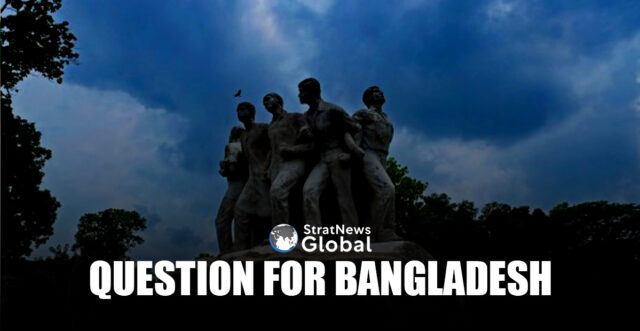The recent political upheaval in Bangladesh has captured global attention, marking a critical juncture for the nation.
The removal of Sheikh Hasina’s government through a combination of student protests, alleged Islamist influence, and external meddling is being celebrated by some as a triumph of popular uprising.
But beneath the euphoria lies a dangerous reality: this regime change, unlike past coups, carries unprecedented risks due to the confluence of internal instability and foreign interference.
Lessons from History: A Familiar But Dangerous Path
Bangladesh’s political history is riddled with abrupt regime changes—most of them through military coups. Each of these changes promised a brighter future, vowing to cleanse the country of corruption and inefficiency. Yet, many of these transitions failed to deliver on their promises, plunging Bangladesh into deeper turmoil and stagnation.
What sets this change apart is the reported involvement of foreign powers, radical Islamist groups, Pakistan’s notorious intelligence agency, the ISI, and influential global actors like George Soros.
Known for funding democratic and social movements worldwide, Soros has often been a polarizing figure. While some view his interventions as support for human rights and democracy, others criticize them as attempts to destabilize governments and impose external agendas. Reports of Soros-funded organizations amplifying the student protests in Bangladesh have raised concerns about the true motives behind this regime change.
While the grievances against Hasina’s administration were legitimate, the orchestration of dissent by external players risks undermining the sovereignty of Bangladesh and turning it into a pawn in broader geopolitical games.
The Purpose of Change: Corruption or Chaos?
At its core, the agitation against Hasina’s government stemmed from genuine grievances. Widespread corruption, economic mismanagement, and unemployment had eroded public trust. However, the focus of the regime change must remain on addressing these issues rather than descending into radical rhetoric and divisive agendas.
The new administration under Nobel laureate Muhammad Yunus must tread carefully. Its legitimacy hinges on a clear roadmap for governance reform, economic revitalization, and free and fair elections. This is not the time for communal rhetoric, inflammatory posturing against neighbours like India, or succumbing to the influence of foreign entities like Soros-funded groups, whose priorities may not align with Bangladesh’s national interest.
The presence of hardcore Islamists with links to rabid outfits like the Al Qaeda and ISIS in the Yunus administration have added to global concerns over its motives, and should worry every secular Bangladeshi.
The question that every thinking Bangladeshi must ask is this: was the regime change meant to improve governance, eradicate corruption, expand employment, and bolster the economy? Or was it hijacked by forces aiming to destabilize the region, sow hatred against minorities, and provoke hostility toward India?
Sheikh Hasina’s Legacy: Balancing Giants
While Sheikh Hasina’s government faced valid criticism for corruption, her foreign policy achievements cannot be ignored. She skillfully balanced relations with India and China, leveraging their cooperation for Bangladesh’s development. Under her leadership, Dhaka maintained constructive ties with New Delhi, crucial for ensuring regional stability, economic growth, and security.
Bangladesh cannot afford to lose this balance. A hostile stance toward India—fuelled by radical elements, propaganda, and external influences like Soros—would be disastrous. India remains Bangladesh’s largest trading partner and a vital ally in counterterrorism. A breakdown in this relationship would isolate Dhaka regionally and risk turning Bangladesh into a playground for disruptive external forces, including Pakistan.
The Threat of Radical Islamism
The rise of radical Islamist forces within Bangladesh poses an existential threat to its secular foundation. Groups like Hizb ut-Tahrir, emboldened by the regime change, are already making inroads, raising concerns for both Bangladesh and its neighbours. India, in particular, has been vocal about its worries, having recently designated Hizb ut-Tahrir as a terrorist organization.
The HuT, along with other rabid Islamist outfits like Ansarullah Bangla Team, Islami Andolan and the pro-Pakistan Jamaat-e-Islami, hijacked the student movement that led to the ouster of PM Sheikh Hasina in August.
The Yunus administration, which released a bunch of hardcore terrorists from jail almost immediately after taking over, went on to appoint Nasimul Gani, one of the founder members of Hizb-ut-Tahrir Bangladesh, as home secretary. Mahfuz Alam, whose social media post advocating annexation of parts of India amused and then angered New Delhi, is another HuT member and a key adviser to Yunus.
Cross-border terrorism remains a pressing challenge, especially given the porous nature of the India-Bangladesh border. A surge in extremist activity could strain India’s resources, destabilize its eastern states, and derail efforts to foster regional peace. Bangladesh must recognize that pandering to Islamist elements will only exacerbate internal divisions and erode its secular identity.
George Soros and the Risk of External Agendas
Soros’s involvement in political movements worldwide often sparks polarized reactions. While his Open Society Foundations claim to support democracy and human rights, critics argue that their activities often destabilize nations, promoting regime changes that align with specific globalist agendas. India’s External Affairs Minister Dr S Jaishankar has described him as “old, rich, opinionated and dangerous.”
And Soros’ son Alexander has publicly described Yunus as an “old friend of my father,” who had “stepped in to lead Bangladesh towards a peaceful future….”
In Bangladesh, allegations of Soros’s backing raise questions about whether the regime change is a grassroots movement or part of a larger, externally driven strategy. His track record in other regions suggests that while initial interventions may claim to promote reform, the aftermath often leaves nations grappling with division, weakened sovereignty, and policy directions that prioritize external interests over local needs.
The Yunus administration must resist being swayed by such influences. Bangladesh’s progress depends on fostering internal reforms and maintaining sovereignty, not on becoming a stage for global power struggles.
India’s Role and Strategic Calculations
For India, the stakes in Bangladesh are higher than ever. As a close neighbour and regional partner, India has invested heavily in fostering stability in Bangladesh. The two nations share a history of cooperation in counterterrorism, trade, and infrastructure development.
India’s response to the crisis will likely involve a measured approach. While publicly advocating for stability and democracy, New Delhi will be preparing for potential fallout. Increased military vigilance along the 4,000-kilometer border, heightened counterterrorism measures, and backchannel diplomacy will be crucial in navigating this crisis.
However, New Delhi must also tread cautiously to avoid being perceived as meddling in Bangladesh’s internal affairs. A stable, democratic Bangladesh is not just in India’s interest but also critical for the region’s broader geopolitical stability.
The Path Forward
Bangladesh stands at a crossroads. The new administration must focus on governance reforms, economic recovery, and creating opportunities for its youth. Radical rhetoric, communal polarization, and external interference—whether from Islamist forces, the ISI, or global actors like George Soros—must not derail the nation’s progress.
It is imperative for the Yunus government to hold free and fair elections, restore constitutional order, and uphold secular values. Religious leaders and outfits must stay out of politics, focusing instead on education and social reform.
As Bangladesh charts its future, it must remember that its strength lies in unity, secularism, and constructive engagement with neighbours. The success of this regime change will be measured not by the rhetoric of its leaders but by tangible improvements in governance, economic development, and social harmony.
For now, the euphoria of change must be tempered with caution, pragmatism, and a clear-eyed understanding of the stakes. Bangladesh has an opportunity to emerge stronger from this crisis—but only if it avoids the pitfalls of history and the allure of divisive ideologies.
In a career spanning three decades and counting, Ramananda (Ram to his friends) has been the foreign editor of The Telegraph, Outlook Magazine and the New Indian Express. He helped set up rediff.com’s editorial operations in San Jose and New York, helmed sify.com, and was the founder editor of India.com.
His work has featured in national and international publications like the Al Jazeera Centre for Studies, Global Times and Ashahi Shimbun. But his one constant over all these years, he says, has been the attempt to understand rising India’s place in the world.
He can rustle up a mean salad, his oil-less pepper chicken is to die for, and all it takes is some beer and rhythm and blues to rock his soul.
Talk to him about foreign and strategic affairs, media, South Asia, China, and of course India.





